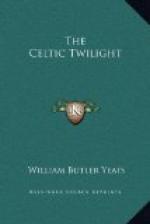Perhaps the constable was right. It is better doubtless to believe much unreason and a little truth than to deny for denial’s sake truth and unreason alike, for when we do this we have not even a rush candle to guide our steps, not even a poor sowlth to dance before us on the marsh, and must needs fumble our way into the great emptiness where dwell the mis-shapen dhouls. And after all, can we come to so great evil if we keep a little fire on our hearths and in our souls, and welcome with open hand whatever of excellent come to warm itself, whether it be man or phantom, and do not say too fiercely, even to the dhouls themselves, “Be ye gone”? When all is said and done, how do we not know but that our own unreason may be better than another’s truth? for it has been warmed on our hearths and in our souls, and is ready for the wild bees of truth to hive in it, and make their sweet honey. Come into the world again, wild bees, wild bees!
MORTAL HELP
One hears in the old poems of men taken away to help the gods in a battle, and Cuchullan won the goddess Fand for a while, by helping her married sister and her sister’s husband to overthrow another nation of the Land of Promise. I have been told, too, that the people of faery cannot even play at hurley unless they have on either side some mortal, whose body, or whatever has been put in its place, as the story-teller would say, is asleep at home. Without mortal help they are shadowy and cannot even strike the balls. One day I was walking over some marshy land in Galway with a friend when we found an old, hard-featured man digging a ditch. My friend had heard that this man had seen a wonderful sight of some kind, and at last we got the story out of him. When he was a boy he was working one day with about thirty men and women and boys. They were beyond Tuam and not far from Knock-na-gur. Presently they saw, all thirty of them, and at a distance of about half-a-mile, some hundred and fifty of the people of faery. There were two of them, he said, in dark clothes like people of our own time, who stood about a hundred yards from one another, but the others wore clothes of all colours, “bracket” or chequered, and some with red waistcoats.




